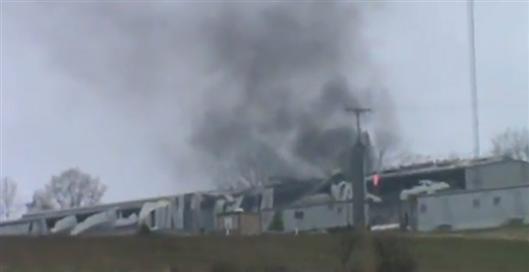Why Shouldn’t Dallas Allow Compressors 500 Feet From Homes and Schools? Because They Explode
 Sharon already caught all of this, but it’s important to note its relevance to what’s going on in the re-writing of the Dallas drilling ordinance. We really wonder if most of the members of the Dallas gas drilling task force knew what a compressor station was and did, or spoke to anyone that’s lived within 500 feet of one. Because on the very last day of the Task Force, and without taking any public input, they decided to let compressors sit on well pads that could be as close as 500-1000 feet from a home, school, hospital or other “protected use.” Why is that a bad idea? Compressors are some of the largest and most polluting kinds of facilities in the natural gas fuel cycle. They routinely emit tens of thousands of tons of air pollution. They are very loud. Their low-decibel noise output can cause serious health effects. And, oh yeah, they can explode, like this Williams Company compressor did in a Pennsylvania township last week: “An explosion at a natural gas compressor station in Susquehanna
Sharon already caught all of this, but it’s important to note its relevance to what’s going on in the re-writing of the Dallas drilling ordinance. We really wonder if most of the members of the Dallas gas drilling task force knew what a compressor station was and did, or spoke to anyone that’s lived within 500 feet of one. Because on the very last day of the Task Force, and without taking any public input, they decided to let compressors sit on well pads that could be as close as 500-1000 feet from a home, school, hospital or other “protected use.” Why is that a bad idea? Compressors are some of the largest and most polluting kinds of facilities in the natural gas fuel cycle. They routinely emit tens of thousands of tons of air pollution. They are very loud. Their low-decibel noise output can cause serious health effects. And, oh yeah, they can explode, like this Williams Company compressor did in a Pennsylvania township last week: “An explosion at a natural gas compressor station in Susquehanna
County on Thursday morning blew a hole in the roof of the complex
holding the engines, shaking homes as far as a half-mile away and
drawing emergency responders from nearby counties. The 11 a.m. blast at the Lathrop compressor station off Route 29 sent
black and gray clouds billowing from the building for several hours,
but the damage was contained to the site and no one was injured, said a
spokeswoman for Williams Partners LP, which owns the Lathrop station.” A half mile is more than twice the distance of the elastic 500-1000 foot buffer zone the Dallas task force recommended. The compressor station pressurizes and dehydrates natural gas from the local Marcellus Shale for transport to market. It was moving 365 million cubic feet of gas PER DAY. In reports on the day of the accident, Williams and its partners sounded very contrite. But then this happened: “A damaged Susquehanna County natural gas compressor station restarted
operations last week despite state regulators’ request the facility
remain shut down during an investigation, the Department of
Environmental Protection said Wednesday.Williams Partners turned on some of the seven compressor engines at
the Lathrop station without permission Friday evening after the state
denied the company’s request to begin operating in a limited capacity,
regulators said.” And so besides demonstrating why 500-100 feet might be a bit too close to put a compressor to your children’s swing set, this story also shows why we also need every local government to have its on gas enforcement infrastructure that watches these gas operators like hawks, not ostriches.
